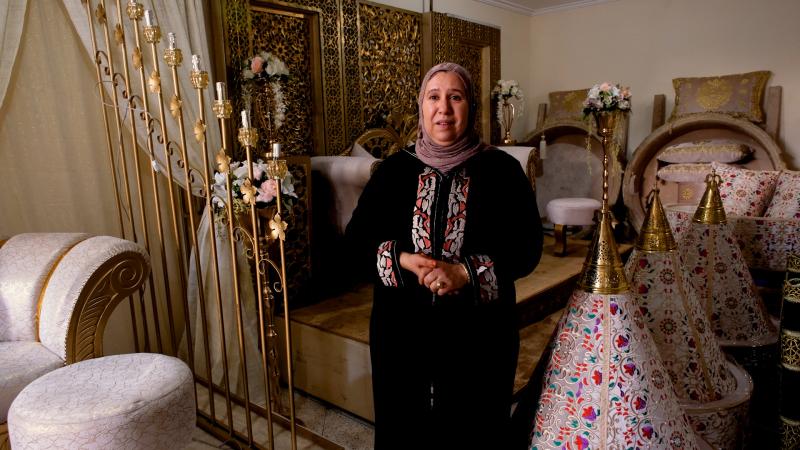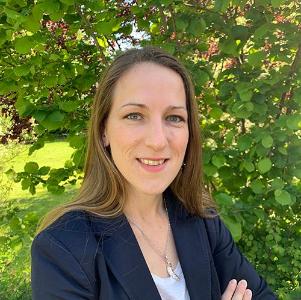Moroccan women use e-commerce training and coaching from a microfinance institution to expand their businesses during tough times
Salima Ennabali opened her own boutique to showcase her interest in sewing and fashion design. “When I used to pass by sewing shops,” she says, “I was fascinated with the traditional Moroccan dresses.”
She hangs one of her hand-embroidered dresses in her shop on a busy street in Meknes, northern Morocco. She places it alongside other dresses in the perfect spot on the wall to advertise the variety of colours she offers. Then she takes a picture of her display for social media. It’s smart sales and good marketing – something she learnt from a microfinance institution that helps women succeed during hard times.
Ennabali got a loan to open her shop from Attadamoune Micro-Finance, a lending firm that gives advice and small loans to hundreds of businesses across Morocco. It offers up to €13 600 to micro-entrepreneurs, focusing on people having a tough time getting help from traditional banks. What makes this financial institution stand out is its nonfinancial offering for women, including training courses and individual coaching to help micro-entrepreneurs boost their revenue and grow their businesses.
“Attadamoune Micro-Finance started out as an association whose aim was to support women in precarious situations, in recognition of the central place women hold in Moroccan families,” says Kenza Serrhini, head of marketing at the institution.
Attadamoune means “solidarity” in Arabic. The firm was founded by a woman, Khaddouj Gharbi, in 1994 and is the only microfinance institution in Morocco led by a woman. This type of female leadership builds trust with the clients. Seventy percent of the firm’s clients are women-led businesses.
Coaching to help Moroccan women get ahead
“Trust is a core value between clients and the institution’s staff,” says Larbi Lahjouji, head of Attadamoune Micro-Finance’s branch network. The firm’s employees work hard to build close relationships with clients, Lahjouji says. Ennabali has come to know the head of her local Attadamoune Micro-Finance branch well. Her latest micro-loan, which she used to buy her shop, isn’t the first one the institution gave her.
Non-financial services offered by micro-finance firms enable entrepreneurs to get advice and professional support in developing and implementing business plans. Small businesses and entrepreneurs have a hard time finding this type of help. The European Investment Bank has a long history of encouraging micro-finance and providing advisory services to entrepreneurs in Africa and other parts of the world, because small companies are the backbone of most economies.
A €63 000 technical assistance grant from the European Investment Bank’s Financial Inclusion Fund enabled Attadamoune Micro-Finance to develop a “post-crisis entrepreneurship motivator” programme. From 2020 to 2022, this programme helped 450 female entrepreneurs, including Ennabali, receive training in e-commerce. As the coronavirus pandemic forced people to stay home, this programme helped female-led businesses stay in touch with clients. This especially helps entrepreneurs in Morocco, where personal relations are an important feature in daily life.
- Read how trust funds help African entrepreneurs survive when the chances of success are low.
The Financial Inclusion Fund is a trust fund managed by EIB Global, the development arm of the European Investment Bank. Contributions to EIB trust funds are made mostly by EU countries. EIB Global uses these contributions to provide grants, technical support and other financial assistance in dozens of countries to help climate action, social infrastructure, digitalisation, financial inclusion and innovation.
The Financial Inclusion Fund supports vulnerable groups in developing countries. Luxembourg is the first contributor to the Fund, putting up nearly €7million so far to help Africa, the Caribbean and Pacific states, as well as the region known as the EU southern neighbourhood — countries such as Jordan, Lebanon and Tunisia in North Africa and the Near East. This fund also supports gender equality, entrepreneurship and digitalisation.
“It is very satisfying to see the effects of these grants on beneficiaries,” says Cristiana Finotti, a technical assistance expert at EIB Global. “They build resilience to economic shocks, such as the turmoil created by the COVID-19.”
Moroccan women go online for growth
Through the entrepreneurship motivator programme in Morocco, 100 female clients from Attadamoune Micro-Finance received coaching to develop an online business plan. The women learned how to use the Internet to reach a new audience and even export crafts and services. This coaching was especially beneficial during the pandemic. Attadamoune Micro-Finance will now expand the e-commerce training and coaching programme to reach 2 500 women.
The programme helps women to be taken more seriously in the business community and gives them a better chance of receiving loans from traditional banks. This in turn opens new horizons. Take Fatiha Boularf, also an entrepreneur in Meknes who completed Attadamoune’s training programme and works as a negafa, a “guardian” organising traditional Moroccan wedding ceremonies. She provides jewellery and other accessories for women to wear at weddings. Using the e-commerce training, she increased her income and expanded her business internationally. ”My dream after working in different cities in my country is to eventually work abroad,” she says.

Fatiha Boularf used earnings from her business to buy a delivery van and send her children to good schools.
With the extra sales, Boularf qualified for a loan from a local bank and bought a van, so she no longer has to carry her tools and products to weddings by hand. She used her new revenue to send her children to good schools and now plans to buy them a house so they can be more independent.
Influencer fashion from women’s coaching
In Meknes, Ennabali’s business is thriving and she has built an active online presence on three social networks, which helped keep her shop alive during the COVID-19 lockdowns. She is a YouTube influencer and has repaid all her loans. She provides work for 40 women who help her sew the dresses she designs. Her goal is to help as many women as possible, especially those having the hardest time getting by in life.
“My dream is to run a large store in a posh neighbourhood, where I can employ the largest possible number of employees,” she says, “especially widows, divorcees and those responsible for caring for their parents.”
- Read how trust funds improve drinking water in poor countries.
